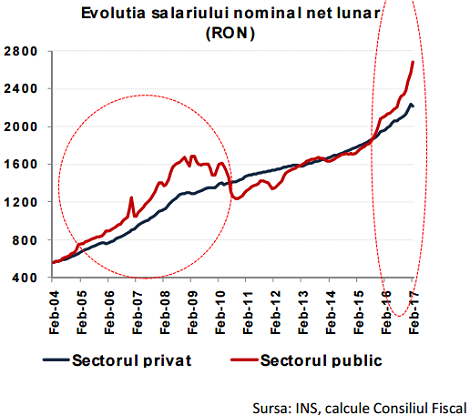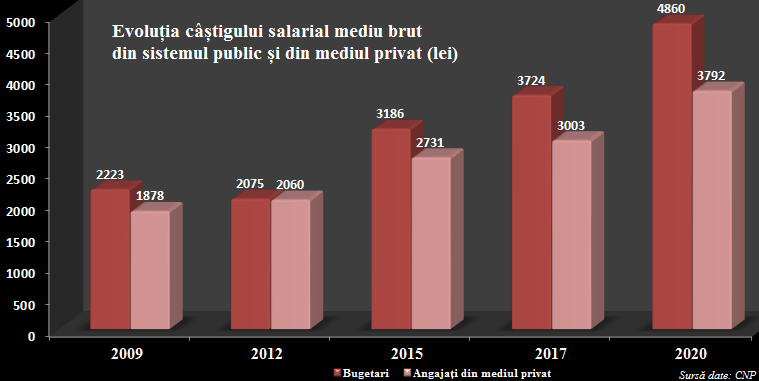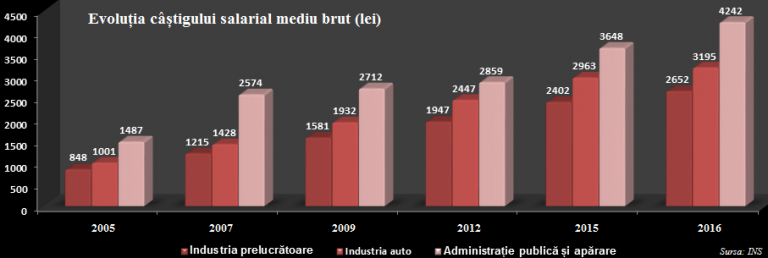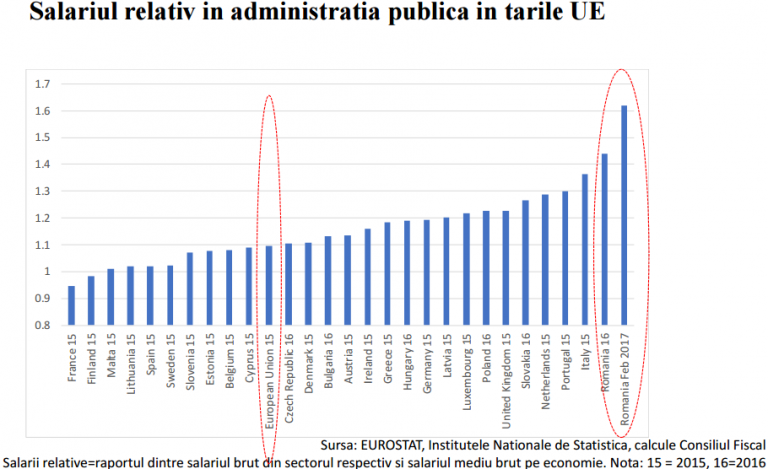 Increasing discrepancies between the wages in the public and private sectors will broaden inequalities between the two sectors and have serious effects on the labour market and the real economy, warn business community and trade unions leaders and human resources experts.
Increasing discrepancies between the wages in the public and private sectors will broaden inequalities between the two sectors and have serious effects on the labour market and the real economy, warn business community and trade unions leaders and human resources experts.
A forgotten lesson
The unitary pay law, in the form presented by Liviu Dragnea, will broaden the salary gaps that have already become significant in recent months, according to an analysis by Ionut Dumitru, the Chairman of the Fiscal Council:
*
- Evolution of the monthly nominal net salary
- Public sector Private sector
- Source: INS, calculations of Fiscal Council
*
In the last year, the situation from the interval 2005 – 2008 repeated in a much more accelerated form, notices the analysis. At that moment, the remuneration in the public sector exceeded the wage in the private sector and continued to increase afterward, reaching the peak right at the onset of the financial crisis.
The outcome – Romania was forced to cut wages by 25% in 2010.
2012, the only year in the last decade when average earnings in the private sector exceeded those from the state. By very little
In 2009, the difference between the average wage in the public and the private sector was 345 lei, but the two sectors reached to equality following the 25% cut applied in 2010 and the elimination of some bonuses.
In the past 10 years, the average earnings in the private sector succeeded to surpass those of the public servants, even though symbolically, in one year – 2012, when the wages in the real economy stood at 2,075 lei and in the public sector at 2,060 lei:
*
- Evolution of the gross average national wage in the public and private sector (lei)
*
In 2015, the gap already went up to almost 600 lei, and this year, according to the National Prognosis Commission (CNP), will reach over 700 lei, and in 2020 these earnings are expected to be by more than 1,000 lei higher in the state sector.
If we refer to areas of activity, the situation is even worse, with the wages in the public sector exceeding in October 2016 some segments of the real economy with an important contribution to Romania’s GDP:
- By more than 1,000 lei above the average earnings in the automotive industry
- By almost 1,500 lei above the gross average earnings in the manufacturing industry
*
- Evolution of the gross average national wage (lei)
*
As we see in the graph, the hierarchy of the wages in the three sectors is as distorted as in 2007, before the crisis.
The differences have also increased though in the first two months of this year, and the situation is completely different from the practice of other former communist EU member countries, according to the analysis of the Fiscal Council (where RS = ratio between gross average wage in a sector and gross average national wage):
*
- Average wage
- Private sector
- Public sector
- Public administration
- Education
- Healthcare
*
This is how Romania has recorded the highest relative salary in public administration:
*
- Relative salary in public administration from EU countries
- Source: EUROSTAT, national statistics institutes, calculations of the Fiscal Council
- Relative salary – ratio between gross average wage in a sector and gross average national wage
*
Risks of these growing gaps – widening of workforce deficit private sector
These wage policies of the governmental decision makers could have risky effects for the real economy, warn leaders of unions and business community.
 Cristian Parvan (photo), president of PIAROM, does not believe that the unitary pay law will come into force or at least not in the form presented by Liviu Dragnea.
Cristian Parvan (photo), president of PIAROM, does not believe that the unitary pay law will come into force or at least not in the form presented by Liviu Dragnea.
„It is unrealistic and much too optimistic,” he says, confident that the budget cannot sustain the increases announced.
„There has been a psychological pressure put for the moment on the private sector”, especially since „the pyramid of values related to the social importance of some activities has already been overturned,” explained Cristian Parvan for cursdeguvernare.ro „In what other place is the salary in the manufacturing industry below the state sector? ”
In his opinion, if the unitary pay law enters into force, there will be two important effects:
- „There are signs that competent people go to the public administration. That will deepen the shortage of qualified labour force in the private sector”
- „Those left in the private sector will demand more consistent salaries. In the last few years, there have been modest increases of 3 – 4 – 5% … When it comes to wages, governors should take into account how much the country is able to pay and the overall productivity of society.”
 „The private environment and the public sector were already two parallel worlds. The biggest risk, given this shortage of candidates, is to find ourselves in a situation where the public sector will become more attractive than the private sector, the one that supports the payment of salaries in the public sector, „says Florin Godean, Country Manager of Adecco Romania (photo).
„The private environment and the public sector were already two parallel worlds. The biggest risk, given this shortage of candidates, is to find ourselves in a situation where the public sector will become more attractive than the private sector, the one that supports the payment of salaries in the public sector, „says Florin Godean, Country Manager of Adecco Romania (photo).
In the current phase though, transfers from the private to the public system are not to be expected, he says and explains: „I have serious doubts that someone from the private sector, who is building a career, will go to the public sector where she has no guarantee that her results and skills would be rewarded in the long run.
Yes, in the immediate future, the work is better paid, but in the long run, we should keep in mind that we are a state that takes unpredictable decisions.”
In the case of young graduates, the situation is different and „if they had a choice between the public and the private system, they would probably go to the state sector, especially that salaries would be high even for the early career” said Florin Godean for cursdeguvernare.ro.
A new pressure for migration
 Bogdan Hossu, president of “Cartel Alfa” Confederation (photo), is certain that employees from the private sector would be demotivated and either try to access the public sector or massively go abroad.
Bogdan Hossu, president of “Cartel Alfa” Confederation (photo), is certain that employees from the private sector would be demotivated and either try to access the public sector or massively go abroad.
We have 3.5 million Romanians abroad, working people who are dynamic, work well, have initiative and generate growth, says Hossu, but they have left because of the wages.
Many of those who are now dissatisfied with the widening of the payment gap will choose the same solution, especially that the private sector is particularly condensed – out of about 2.7 million employees, about two million have the average wage on the economy, explains Bogdan Hossu.














